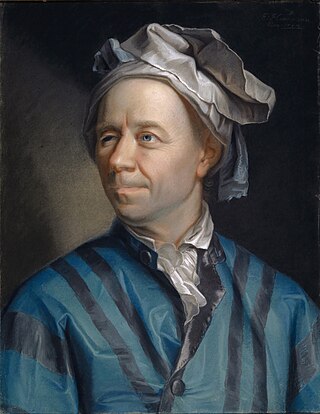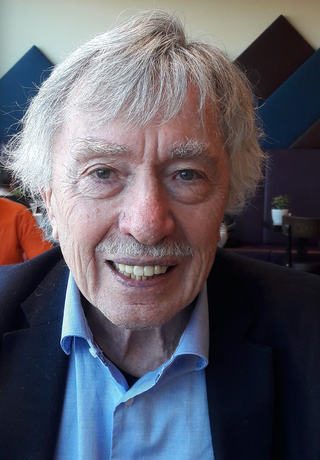
Christian Goldbach was a Prussian mathematician connected with some important research mainly in number theory; he also studied law and took an interest in and a role in the Russian court. After traveling around Europe in his early life, he landed in Russia in 1725 as a professor at the newly founded Saint Petersburg Academy of Sciences. Goldbach jointly led the Academy in 1737. However, he relinquished duties in the Academy in 1742 and worked in the Russian Ministry of Foreign Affairs until his death in 1764. He is remembered today for Goldbach's conjecture and the Goldbach–Euler Theorem. He had a close friendship with famous mathematician Leonhard Euler, serving as inspiration for Euler's mathematical pursuits.

Leonhard Euler was a Swiss mathematician, physicist, astronomer, geographer, logician, and engineer who founded the studies of graph theory and topology and made pioneering and influential discoveries in many other branches of mathematics such as analytic number theory, complex analysis, and infinitesimal calculus. He introduced much of modern mathematical terminology and notation, including the notion of a mathematical function. He is also known for his work in mechanics, fluid dynamics, optics, astronomy, and music theory.

Jakob Hermann was a mathematician who worked on problems in classical mechanics. He is the author of Phoronomia, an early treatise on mechanics in Latin, which has been translated by Ian Bruce in 2015-16. In 1729, he proclaimed that it was as easy to graph a locus on the polar coordinate system as it was to graph it on the Cartesian coordinate system.

Anders Johan Lexell was a Finnish-Swedish astronomer, mathematician, and physicist who spent most of his life in Imperial Russia, where he was known as Andrei Ivanovich Leksel.

Ivor Owen Grattan-Guinness was a historian of mathematics and logic.

Gisbert Wüstholz is a German mathematician internationally known for his fundamental contributions to number theory and arithmetic geometry.

The Royal Prussian Academy of Sciences was an academy established in Berlin, Germany on 11 July 1700, four years after the Prussian Academy of Arts, or "Arts Academy," to which "Berlin Academy" may also refer. In the 18th century, when French was the language of science and culture, it was a French-language institution.
In mathematics, 1 − 2 + 4 − 8 + ⋯ is the infinite series whose terms are the successive powers of two with alternating signs. As a geometric series, it is characterized by its first term, 1, and its common ratio, −2.

Günter Matthias Ziegler is a German mathematician who has been serving as president of the Free University of Berlin since 2018. Ziegler is known for his research in discrete mathematics and geometry, and particularly on the combinatorics of polytopes.

The Berlin-Brandenburg Academy of Sciences and Humanities, abbreviated BBAW, is the official academic society for the natural sciences and humanities for the German states of Berlin and Brandenburg. Housed in three locations in and around Berlin, Germany, the BBAW is the largest non-university humanities research institute in the region.

Adolph-Andrei Pavlovich Yushkevich was a Soviet historian of mathematics, leading expert in medieval mathematics of the East and the work of Leonhard Euler. He is a winner of George Sarton Medal by the History of Science Society for a lifetime of scholarly achievement.
Christoph J. Scriba was a German historian of mathematics.

Joseph Ehrenfried Hofmann was a German historian of mathematics, known for his research on Gottfried Wilhelm Leibniz.
Eberhard Wächtler was a German economic historian. He was particularly notable for research in coal and steel sciences in postwar Germany.

Norbert Schappacher is a German mathematician and historian of mathematics. He was an Invited Speaker at the International Congress of Mathematicians in 2010 in Hyderabad.
The Stiftung Benedictus Gotthelf Teubner Leipzig / Dresden / Berlin / Stuttgart, in short: Teubner-Stiftung, was founded on 21 February 2003 in the Haus des Buches at Gutenbergplatz, Leipzig.
Andrea Bréard is a German historian of mathematics and sinologist specializing in Chinese mathematics. She is Alexander von Humboldt Professor of Sinology in the Department of Classical World and Asian Cultures at the University of Erlangen–Nuremberg.
Walter Purkert is a German mathematician and historian of mathematics.

Ivo Hans Schneider is a German mathematician and historian of mathematics and the natural sciences.













